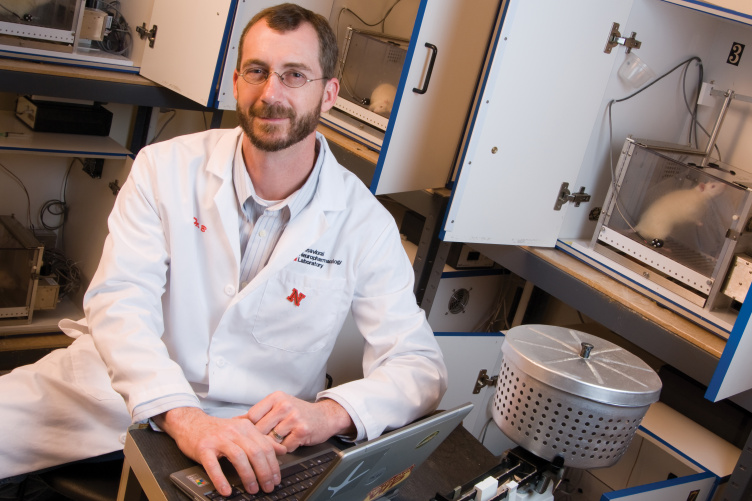
The Center of Integrated Biomedical and Bioengineering Research (CIBBR) is hosting a series of seminars in 2018-2019 that will bring prominent scientists from the fields of biomedical and bioengineering research to UNH's campus to present and meet with faculty.
The second speaker in this series will be Rick Bevins, a neuroscientist from the University of Nebraska - Lincoln whose research team uses preclinical animal models to elucidate the behavioral, neural, and pharmacological factors involved in the etiology of drug abuse
Topic: Tobacco regulatory science and the investigation of factors altering the abuse liability of nicotine
When & Where: Nov. 15, 2018 3:40 – 4:30 p.m. McConnell Hall 220
Reception to Follow
Abstract: According to the World Health Organization, “No other consumer product is as dangerous, or kills as many people. Tobacco kills more than AIDS, legal drugs, illegal drugs, road accidents, murder, and suicide combined” (The Tobacco Atlas [p.36]). Nicotine is the primary addictive constituent in tobacco products. Although nicotine does have primary reinforcing effects that contribute importantly to smoking and nicotine dependence, convergent evidence suggests that such effects cannot fully explain the tenacity of this addiction. This observation has led researchers to investigate other possible factors contributing to the abuse liability of nicotine. In this talk, I will briefly describe two such factors that my lab has been investigating – reinforcer enhancement and acquired reinforcement value. In the former, we have employed a behavioral economic approach with rats to examine how nicotine increases the value of other reinforcers in the environment. This research has explored sex differences using sensory reinforcers and, more recently, alcohol. Another factor altering the abuse liability of nicotine is interoceptive conditioning. In this research, nicotine serves as an internal stimulus that is paired with other reinforcing events (e.g., sucrose in our preclinical model). Our initial studies merging nicotine interoceptive conditioning with intravenous self-administration indicate that an excitatory conditioning history with nicotine increases later intake of nicotine. In light of these findings, as the United States Food and Drug Administration considers reducing nicotine in tobacco products below a dose that does not purportedly support dependence, alternative factors beyond the primary reinforcing effects of nicotine should be taken into account.
Rick Bevins Bio: I did my Ph.D. work at the University of Massachusetts at Amherst in Neuroscience and Behavior (1989-93) and then moved to a post-doctoral position at the University of Kentucky (1993-96). In 1996, I joined the faculty of the Psychology Department at the University of Nebraska-Lincoln as an Assistant Professor and established the Behavioral Neuropharmacology Laboratory. Fast forward 22 years, I am currently Chancellor’s Professor and Chair of Psychology.
With the talent and energy of undergraduate students, graduate students and post-docs, my research team uses preclinical animal models to elucidate the behavioral, neural, and pharmacological factors involved in the etiology of drug abuse. One arm of this research program investigates how behavioral and neuropharmacological processes involved in the perceptibility of a drug stimulus and the behavior it controls changes with learning history. Other empirical efforts focus on novel pharmaco-therapeutic approaches for nicotine and methamphetamine addiction, understanding the reward-enhancing effects of drugs using behavioral economics, and development of more translationally relevant animal models to inform FDA tobacco regulatory policy. We are also extending these arms of the research program to include sex differences and nicotine-alcohol interaction. I have over 140 publications in these areas, as well as two edited volumes on drug abuse. Further, these research efforts have been funded by UNL, Nebraska Department of Health, and the National Institute of Health for over 20 years.















































